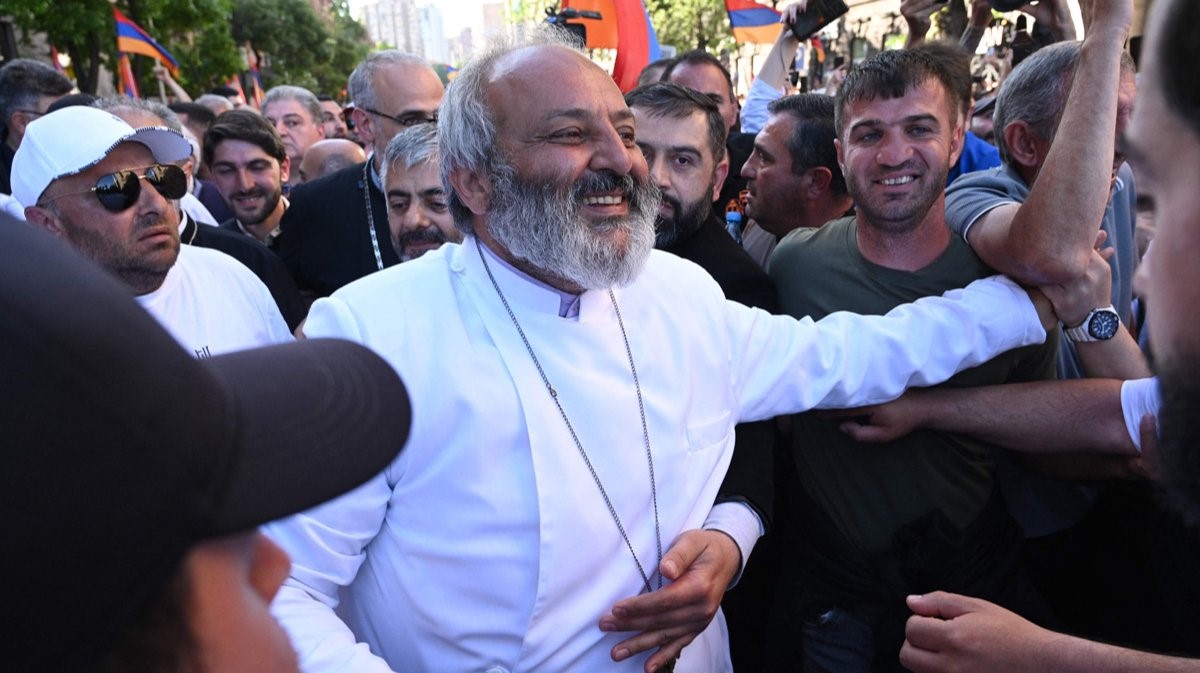Galstanyan, the Armenian bishop who aspires to government
The archbishop of Tavowš, the area most affected by the latest disputes with the Azeris, is now the leader of the forces opposing negotiations with Baku. Supported by the katholikos Karekin II himself, he has asked to be suspended from his pastoral duties, but he nevertheless takes to the streets in his episcopal vestments, not escaping the jostling of the police forces. And he makes no secret of his ambition to lead the country after overthrowing the ‘traitor’ Pašinyan.
Yerevan (AsiaNews) - A new figure is imposing himself on the political scene in Armenia, torn by the conflict between the majority forces, in favour of peace talks with Azerbaijan, and the opposition forces that claim to defend the border territories. Since 9 May, the latter have found their leader in a cleric, Archbishop Bagrat Galstanyan of the Tavowš diocese, the area most affected by the latest disputes between Armenians and Azeris.
After a ‘march on Yerevan’ across Armenia from the periphery towards the centre, in imitation of the one that brought the current premier Nikol Pašinyan to power, the bishop is now inciting continuous street protests.
The last procession left the capital's St Anne's Church without saying where it was headed, ‘towards an important place’, Bagrat assured, and finally reached the office of the Guarantor for Human Rights, ‘to get answers to our questions, and to know if rights still exist in our country’.
Archbishop Galstanyan is acting with the blessing of the Patriarch of the Armenian Apostolic Church, Katholikos Karekin II, making clear the Church's opposition to the policies of the current government, and the role of direct intervention in social issues by a religious institution that wants to represent the identity of the entire population.
The bishop has been suspended from his pastoral duties at his own request, which does not prevent him from taking to the streets with the vestments and furnishings of his ecclesiastical dignity to lead the movement ‘Tavowš in the name of the Homeland’, which coagulates around it groups and parties of all kinds of opposition, even those that are ideologically very far from the Church and religion, but all rather in favour of relations with Russia.
Bagrat is a monk like all bishops in the Eastern traditions, and therefore has no family other than the Church and the people, and makes no secret of his ambitions to take over the role of prime minister after overthrowing the current ‘traitor’ Pašinyan.
The 53-year-old archbishop has impressed with his energy and charisma, not shying away from jostling with the police and holding fiery rallies in the streets, then abandoning himself to the embraces of thousands of supporters. His qualities as a politician are evident in his ability to engage in continuous negotiations with representatives of other political forces, entrepreneurs and businessmen, and even Armenian diaspora groups around the world.
Calling for the suspension from the clerical office, Bagrat showed his confidence in his fate: ‘I cannot keep my office together with the premiership, I am ready to lay down this sacrifice on the sacred altar of the fatherland’.
The opposition parties, however, do not have enough votes in parliament to subject Pašinyan to impeachment proceedings, and they have already been defeated in early elections once, considering that the current premier had in turn won power after a ‘gentle revolution’, raising the people against the corruption of the post-Soviet and pro-Russian ruling caste of his predecessors.
Another problem stems from Galstanyan's Canadian citizenship, which he received 20 years ago as a young bishop of the North American eparchy. The procedure to become Armenian only is rather lengthy, and laws forbid institutional positions to those with dual citizenship, although he assures that ‘for service to the homeland’ he will throw away his second passport.
The most sensational issue, however, remains the bishop's very un-‘pacifist’ stance of inciting confrontation with Azerbaijani enemies, when the secular prime minister preaches dialogue and conflict resolution, a stance that Galstanyan condemns as ‘worthy of a slave’, challenging the president of Azerbaijan with the words ‘I'll tell you to your face: your little friend in Armenia has no power now’.
The archbishop-candidate premier began his ecclesiastical career in 1988, entering the seminary while still in Soviet times and holding various positions in the curia of the Holy Ečmjadzin, the see of the Apostolic Katholikos-Patriarch, before finishing his studies in England and returning as patriarchal information officer, before being sent to Canada.
He had been a border bishop since 2015 and no one knew him, and his parable of the last month appears to many Armenians as a true revelation of the divine will for the rebirth of Christian Armenia.
07/02/2019 17:28







.png)










